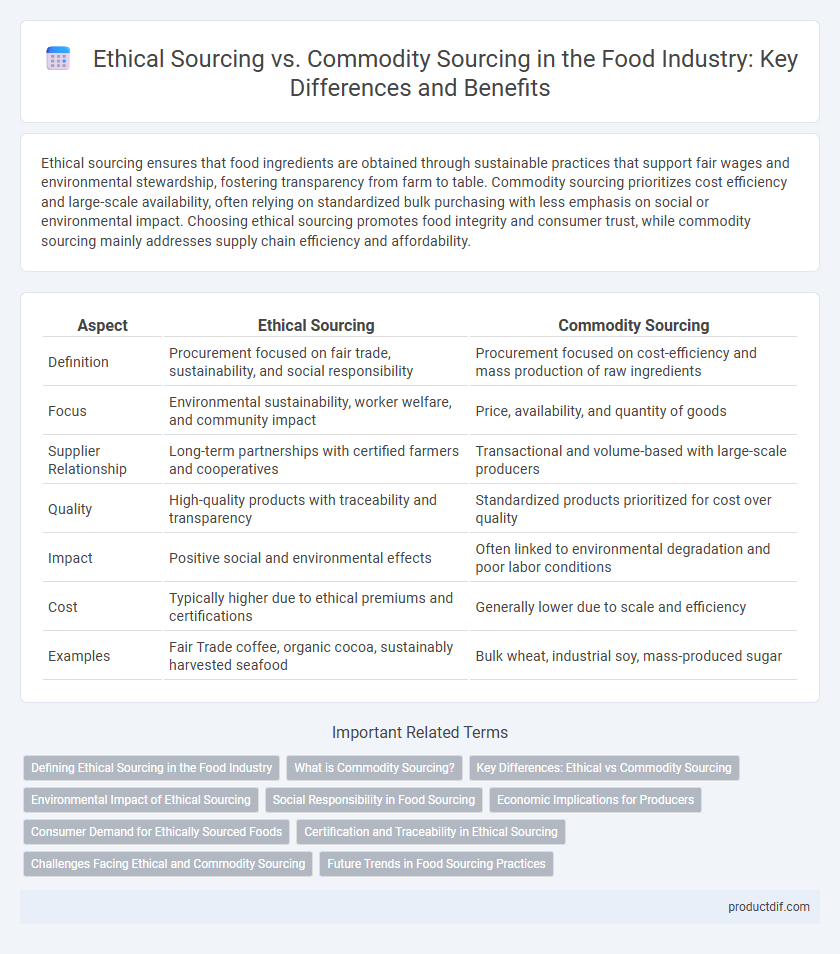Ethical sourcing ensures that food ingredients are obtained through sustainable practices that support fair wages and environmental stewardship, fostering transparency from farm to table. Commodity sourcing prioritizes cost efficiency and large-scale availability, often relying on standardized bulk purchasing with less emphasis on social or environmental impact. Choosing ethical sourcing promotes food integrity and consumer trust, while commodity sourcing mainly addresses supply chain efficiency and affordability.
Table of Comparison
| Aspect | Ethical Sourcing | Commodity Sourcing |
|---|---|---|
| Definition | Procurement focused on fair trade, sustainability, and social responsibility | Procurement focused on cost-efficiency and mass production of raw ingredients |
| Focus | Environmental sustainability, worker welfare, and community impact | Price, availability, and quantity of goods |
| Supplier Relationship | Long-term partnerships with certified farmers and cooperatives | Transactional and volume-based with large-scale producers |
| Quality | High-quality products with traceability and transparency | Standardized products prioritized for cost over quality |
| Impact | Positive social and environmental effects | Often linked to environmental degradation and poor labor conditions |
| Cost | Typically higher due to ethical premiums and certifications | Generally lower due to scale and efficiency |
| Examples | Fair Trade coffee, organic cocoa, sustainably harvested seafood | Bulk wheat, industrial soy, mass-produced sugar |
Defining Ethical Sourcing in the Food Industry
Ethical sourcing in the food industry prioritizes transparency, sustainability, and fair labor practices throughout the supply chain. It involves selecting suppliers who adhere to environmental stewardship, animal welfare standards, and equitable treatment of workers, contrasting with commodity sourcing focused primarily on cost and volume. This approach ensures that food products contribute positively to social and ecological systems while maintaining high-quality standards for consumers.
What is Commodity Sourcing?
Commodity sourcing refers to the procurement of bulk raw materials or standard food products primarily based on price and availability rather than ethical considerations. This approach focuses on maximizing cost efficiency and securing large quantities of staple items like grains, oils, and sugars from global markets. It often overlooks factors such as environmental impact, fair labor practices, and sustainable farming methods, distinguishing it from ethical sourcing strategies.
Key Differences: Ethical vs Commodity Sourcing
Ethical sourcing prioritizes sustainable farming practices, fair labor conditions, and environmental stewardship to ensure product integrity and social responsibility, while commodity sourcing focuses on bulk procurement driven by cost efficiency and market availability. Ethical sourcing often involves certifications such as Fair Trade or Rainforest Alliance, which guarantee transparency and traceability, contrasting with commodity sourcing's emphasis on standardized quality and volume. The key differences lie in the impact on communities and ecosystems, with ethical sourcing fostering long-term benefits versus commodity sourcing aiming for short-term economic gains.
Environmental Impact of Ethical Sourcing
Ethical sourcing prioritizes sustainable farming practices, reducing deforestation, soil degradation, and water pollution compared to commodity sourcing. It supports biodiversity by promoting crop rotation and agroforestry, which enhances ecosystem resilience. These environmentally responsible choices help lower carbon emissions and protect natural resources for future generations.
Social Responsibility in Food Sourcing
Ethical sourcing in food prioritizes fair labor practices, animal welfare, and community development, ensuring producers receive fair wages and work in safe conditions. Commodity sourcing typically focuses on cost-efficiency and large-scale production, often overlooking social and environmental impacts. Emphasizing social responsibility in food sourcing promotes sustainable supply chains that support local economies and reduce exploitation across the global food industry.
Economic Implications for Producers
Ethical sourcing often leads to higher and more stable incomes for producers by ensuring fair trade premiums and improved market access, which helps reduce poverty in farming communities. Commodity sourcing tends to prioritize cost minimization, resulting in price volatility and lower profit margins for producers, increasing economic vulnerability. Investing in ethical supply chains can enhance long-term economic sustainability and resilience for smallholder farmers.
Consumer Demand for Ethically Sourced Foods
Consumer demand for ethically sourced foods has surged, reflecting growing awareness of environmental impact and fair labor practices. Shoppers increasingly prioritize products verified by certifications such as Fair Trade, Rainforest Alliance, and organic labels, driving brands to adopt transparent supply chains. This shift challenges commodity sourcing models that focus primarily on cost and volume, emphasizing sustainability and social responsibility instead.
Certification and Traceability in Ethical Sourcing
Ethical sourcing emphasizes certification standards such as Fair Trade, Rainforest Alliance, and Organic labels to ensure sustainable farming practices and fair labor conditions. Traceability systems in ethical sourcing enable transparent supply chains by tracking the origin of raw materials from farm to table, reducing the risk of exploitation and environmental harm. These certifications and traceability measures build consumer trust and promote accountability compared to conventional commodity sourcing.
Challenges Facing Ethical and Commodity Sourcing
Ethical sourcing faces challenges such as higher costs, limited supplier availability, and the complexity of verifying fair labor practices and environmental impact. Commodity sourcing struggles with price volatility, lack of transparency, and risks of environmental degradation and labor exploitation in global supply chains. Both sourcing methods require robust supply chain management to address sustainability and ethical considerations effectively.
Future Trends in Food Sourcing Practices
Future trends in food sourcing emphasize a shift towards ethical sourcing, prioritizing transparency, sustainability, and fair labor practices over traditional commodity sourcing focused on cost efficiency and volume. Increasing consumer demand for traceability and environmental responsibility drives companies to adopt regenerative agriculture, local procurement, and technology-enabled supply chain audits. Advancements in blockchain and AI further enhance accountability and integration of ethical standards, redefining industry benchmarks for responsible food sourcing.
Ethical sourcing vs Commodity sourcing Infographic

 productdif.com
productdif.com